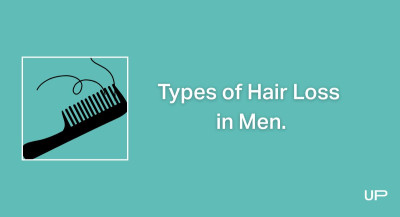Biotin For Balding: All It’s Cracked Up To Be?

A search for hair loss products on your preferred online marketplace will bring up a variety of items. Among these items, you may see Chinese hair-growth serums, hair-building fibres, hair loss medications, perhaps even a thousand-dollar ultraviolet light helmet-looking-thing — whatever that is. One thing’s for sure: you won’t have to scroll too far before stumbling upon a bottle of biotin supplements.
Indeed, there is no shortage of claims that biotin will help regrow hair. At the very least, biotin is marketed as a product that supports healthy nails, hair and skin — so where does that extra leap of promising hair regrowth come from?
What is Biotin
Biotin is one of the eight B vitamins and an essential nutrient humans need to survive. Although it’s widely available as a dietary supplement, biotin is also found in common foods like eggs, salmon, sweet potatoes, some nuts and seeds, and beef liver.
Two of the key roles played by biotin in the body are gene regulation and cell signalling. Since male-pattern baldness — the most common type of hair loss in men — is due in large part to the body’s conversion process of turning testosterone into dihydrotestosterone (DHT), biotin’s ability to affect gene regulation and cell signalling have drawn interest with respect to its role in preventing hair loss.
Does it Work?
Despite the hype associated with hair regrowth, research on biotin’s ability to help with hair loss is not promising. Biotin supplementation showed some positive results in one double-blind study that featured a small sample of women who were experiencing temporarily thinning hair. But a larger academic review of available research found that biotin’s effects on hair loss were less promising.
Though biotin was effective in promoting hair growth and nail health in some participants, these individuals usually suffered from a pre-existing condition like uncombable hair or brittle-nail syndrome. This led the authors of the academic review to conclude that there is a lack of sufficient evidence for biotin’s effectiveness in healthy individuals. What’s more, supplementing one’s diet with biotin is usually unnecessary for most people in the West, who are able to obtain enough biotin from the foods they eat.
That doesn’t mean that taking biotin is necessarily a bad idea. Biotin supplementation is generally safe and, according to the Mayo Clinic, no serious side effects have been reported in people taking up to 10mg per day. If you are thinking about adding biotin to your diet in the form of a supplement, consider talking to your doctor first. But don’t expect it to work any magic in your battle against male-pattern baldness.
Treatments for Male-Pattern Baldness
Fortunately, there are clinically proven treatment options available for male-pattern baldness that have been shown to be effective for many men. Some physician-directed treatments are taken once daily and are designed to help slow hair loss and, in some cases, support regrowth over time when used consistently under medical supervision.
Large clinical studies have shown that a significant percentage of men using medically guided treatment experienced stabilization of hair loss over a multi-year period, with many also seeing visible improvements in hair density and overall coverage. Results tend to build gradually, often becoming more noticeable after several months of consistent use.
Other widely used treatment approaches focus on supporting scalp health and stimulating hair follicles to encourage stronger, thicker growth. Clinical trials have demonstrated that these therapies can improve hair coverage and slow further thinning when used regularly and as directed. In some cases, combining medically supervised treatment approaches may lead to better outcomes than relying on a single method alone.
Because responses vary from person to person, the most appropriate treatment plan depends on factors such as age, stage of hair loss, and overall health. A licensed healthcare provider can help determine the safest and most effective strategy based on individual needs and goals.
Doctor Knows Best
Before exploring any kind of treatment for male-pattern baldness, talk to a doctor. They will be able to assess the reasons why you may be experiencing hair loss and explore all treatment options available to you.
This article is written for informational purposes only and does not constitute medical advice. The information provided in the articles cannot and should not replace advice from a healthcare professional. Talk to your healthcare provider about any physical or mental health concerns or the risks and benefits of any treatment or medication.






